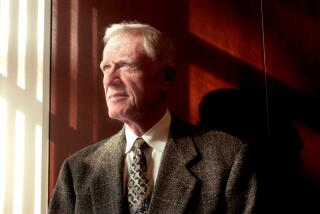Department Head Named to UCSD Psychiatry Chair
- Share via
An internationally respected researcher in psychiatry at UC San Diego has been named the first recipient of an endowed chair in memory of a San Diego pioneer family member.
Dr. Lewis Judd, chairman of the department of psychiatry at UCSD School of Medicine, will assume the Mary Gilman Marston Endowed Chair in Psychiatry.
Marston died at age 107 in July, 1987, after having spent her entire life in San Diego active in the city’s social welfare and cultural circles. In 1870, her father, George, founded Marston’s Department Store, which served as a hub of downtown shopping until it merged with the Broadway chain in 1961. Her father also helped establish the Presidio Museum and Park in Old Town in the early 1930s.
The 4.6-acre Marston house and gardens, built in 1904 just north of Balboa Park, was deeded to the city of San Diego in 1974 by Mary Marston for use as a public park upon her death.
The $250,000 gift by the Marston family to UCSD “was an understandable outgrowth and marriage of her interests in matters of the mind and of public health,” said Arthur Hamilton (Ham) Marston Jr., her nephew and himself a longtime San Diego community activist.
Judd is internationally known for his work on the biological causes of mental illness and ways to develop drugs to treat depression and schizophrenia.
The 61-year-old Judd is credited with having built the UCSD department into an eminent research unit by combining the more traditional psychosocial view of psychiatric illness and a newer “biological viewpoint” recognizing the role of new drugs and possible genetic factors.
Judd took a three-year leave of absence from UCSD from 1988 to 1990 to head the National Institute of Mental Health, the federal agency that supports and oversees much of the mental health research done in the United States.
As part of his tenure there, Judd began a national public information campaign to destigmatize mental illness and to promote better, more accessible treatment of depression. The program, called D/ART, has become nationwide.
More to Read
Sign up for Essential California
The most important California stories and recommendations in your inbox every morning.
You may occasionally receive promotional content from the Los Angeles Times.












